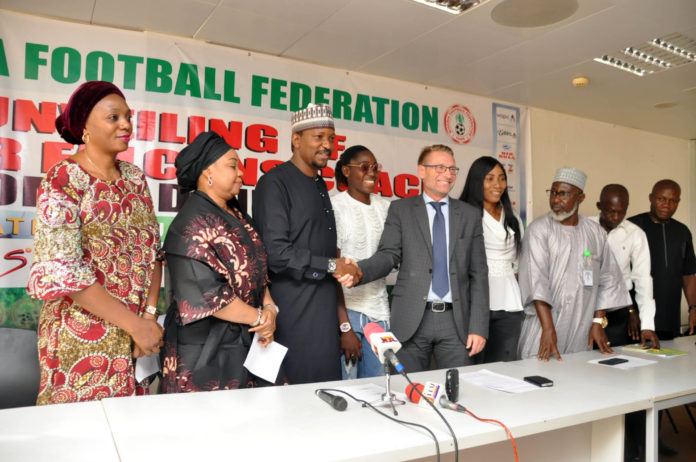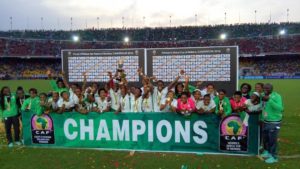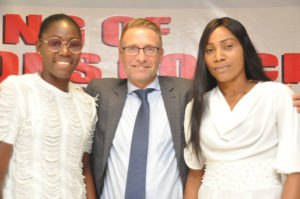
|
Getting your Trinity Audio player ready...
|
By Anthony Akaeze
And so it happened that the Nigeria Football Federation (NFF), finally unveiled its new Super Falcons Coach, Thomas Dennerby, on Tuesday, January 30 in Abuja. It was the finale hunt that was started by NFF some months ago.
According to Nigeria’s soccer management body, its decision to engage Dennerby was
informed by the need to improve the fortunes of the Super Falcons and women’s football in Nigeria generally.
A presser sent to the newsrooms by NFF quoted Shehu Dikko, NFF’s 2nd Vice President and Chairman of Strategy, as saying “The NFF decided to go for a coach of the caliber of Thomas Dennerby for three reasons, to sustain and enhance the Super Falcons’ dominance on the African scene; to take the Falcons and the other women teams to the next level of challenging for laurels at global competitions like the Olympicsand the FIFA World Cup and; to generally lay the foundation for the real development of women’s football in our country.”
Shehu pointed out that though the Super Falcons had been dominant in Africa,
winning eight out of ten African championships so far, it has failed to impress at the International level “A man of Dennerby’s pedigree and capacity, therefore, will guide the Falcons and the other teams to win laurels at global championships”.

It is difficult to dispute NFF’s claim about the Super Falcons. Dominant on the continent as the statistics show, the team has failed to extend its winning streak to the international arena. Every FIFA event and Olympic Games it was billed to be part of, brought fresh hopes that the team would live up to its rating as Africa’s best but each time, it fell short of expectation. Its best performance at the International level, to date, is a second round place achieved at the FIFA Women’s World Cup hosted by USA in 1999. Hence Nigerians are left to wonder each time when the team would fulfill its potential at the International
level.
A sealed deal Dennerby’s contract is now, but something tells me that the NFF did not reveal the real reason it engaged the Swedish coach at this time. Did his recruitment have anything to do with the Super Falcons players revolt in 2016? In December that year, shortly after returning from Cameroun where it competed in the African Women’s championship and clinched its eighth continental crown.
Reports emerged that the Super Falcons were being owed camp allowances and match bonuses dating back to the qualifying stage of the competition, took to the streets of Abuja to protest and demand their entitlements. One of the placards displayed by the girls read: “Those we defeated 1-0 were honored with accolades!!!” It was a reference to the Cameroonian team the Falcons overcame in the final to win the trophy.
Many Nigerians appreciated and applauded their work and sacrifice. What was lacking was the camp allowances and match bonuses as agreed with the NFF. This, according to reports, amounted to $6500 and $17,150 for each of the players as entitlements for the qualifying matches and the competition proper. It was a national disgrace that called into question the leadership quality of the Amaju Pinnick led NFF.
The spectacle of heroines in a matter of days transforming into rebels raised questions about how things could have got to that point. Media reports suggest the girls were forced to adopt that option as all efforts to get the NFF leadership to pay up in Cameroun and after returning to Nigeria failed as it claimed paucity of fund.

Back to Nigeria with the cup, and now lodged in a hotel in the nation’s seat of power, the girls revolted. They refused to vacate the hotel after being told to do so by the NFF and later marched to the National Assembly where Abba Kyari, Chief of Staff to President Muhammadu Buhari assured them that their money would be paid within days. The promise was kept as the presidency got the finance ministry to release the money.
The players later went their various ways and while some observers may be wondering whether the NFF, which had a reputation for violating contracts, had this time around, learned a lesson from the sad episode the chieftains didn’t see it from that point.
They were instead thinking of how to strike back at the team. To the NFF leadership, what the Super Falcons players did was a slight, a slap in their face, and some people must pay the price for rebellion.
What to do? Disbanding a whole team for legitimately pressing its claim didn’t seem a good idea. It might end up stoking more controversy, and, even if condemned to that choice, who would you replace the players with? But scapegoats must be made in a case like this. Sources say in mulling their options, some NFF officials latched on to the idea that the Super Falcons players could not have acted without the backing of some officials of the team.
In fact, to the NFF officials, the Super Falcons players may have gained fillip from their 2004 forebears who won the African Women’s championship in South Africa. That team, like the one that competed in Cameroun, prior to winning the competition, was being
owed money and after triumphing refused to return to Nigeria until their entitlements were paid.
But it is unclear whether all the players and team officials got paid as the views of Godwin Izilien, coach of the team, reported by Ripples Sports, in 2016 in the heat of the Super Falcons protest in Abuja, shows. “You will recall that this was the same embarrassment we faced in South Africa when we won this same cup in 2004. The girls refused to board the plane home until they get paid. I had to plead with them to do a rethink. We returned home after four days of protest in South Africa.” Izilien adds “Today as we speak, I have not been paid by the NFF. In fact, somebody in the Glass House (NFF) told me my file is missing. I’m still pressing for my pay. I worked hard to bring honor to this country only to be denied my statutory entitlement. I’m appealing to the NFF to please pay me now.”
Among the Super Falcons players that competed in South Africa in 2004 was Florence Omagbemi, Perpetua Nkwocha and Ann Chiejine, all-star players who, after hanging their boots, took to coaching, and happened to be coach and assistant coaches of the Super Falcons team in that order in Cameroun.
Following the protest in Abuja, sources say some NFF officials believe that either Omagbemi and her colleagues encouraged the players to take to the streets or they failed to discourage them from toeing that line. These three Super Falcons officials, to narrow it to just them, became the choice target of a bruised NFF. It is a given in football that coaches who excel in competitions get rewarded for their efforts, often through renewal or elongation of contract.
It didn’t happen in the case of Omagbemi and her assistants as they were replaced with new faces including Dennerby. To the decision makers in NFF, this is fair. But no punishment is known to have been dished out to those who failed to live up to
the expectation of paying the Super Falcons players their camp allowances and match bonuses as and when due. They still retain their jobs in NFF. That’s the kind of justice we often see around.













